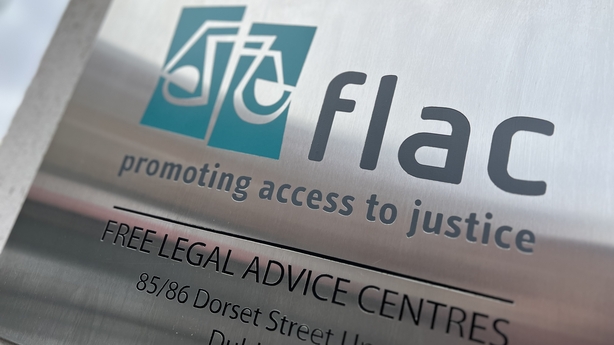Labour has officially launched its family and care referendums campaign with party leader Ivana Bacik saying it is campaigning for a yes-yes vote.
Speaking with reporters at the launch of the campaign in Dublin city centre, Ms Bacik said her party believes the proposed changes to the Constitution represent "a more equal and more inclusive society".
She said: "We did express some disappointment initially at the wording, but we did tease out the wording with Government representatives in the Dáil and Seanad debates.
"We're satisfied that the two referendums do represent a real step forward towards a more contemporary text, towards a fair Ireland and towards a more equal and more inclusive society."
Ms Bacik was joined at the campaign launch by Labour's director of elections for the referendums Senator Marie Sherlock.
FLAC urges no vote in referendum on 'care' amendment
Tánaiste Michéal Martin has criticised a statement from the Free Legal Advice Centres organisation (FLAC) recommending a No vote in the referendum on carers, describing it as a political and not legal statement.
The independent human rights and equality organisation, which offers free legal advice, said the wording of the proposed amendment of the Constitution on care is ineffective.
The forthcoming referendum proposes deleting the current reference to "women in the home" and replacing it with a new article relating to "family care".
The wording is "implicitly sexist" and is unlikely to provide carers, people with disabilities, or older people with any new enforceable rights, FLAC claimed.
We need your consent to load this rte-player contentWe use rte-player to manage extra content that can set cookies on your device and collect data about your activity. Please review their details and accept them to load the content.Manage Preferences
It said it is also unlikely to require the State to provide improved childcare, supports for carers or for children with disabilities.
It said it is "highly regrettable" in relation to the care amendment that voters do not have the choice to simple delete the current provision relating to "women in the home".
This provision is ineffective, sexist and offensive, FLAC said, but the proposed new amendment would give constitutional expression to harmful stereotypes including the concept that providing care to older adults and those with disabilities is the "private responsibility of unpaid family members without any guarantee of State support".
It said like the "explicitly sexist" provision it is proposed to replace, the new article endorses a status quo where women undertake the bulk of unpaid care work. It said the proposed amendment is implicitly sexist by failing to place any obligation on the State to redress this gender imbalance.
FLAC said it would also "give constitutional expression to the harmful stereotype of people with disabilities as subjects of family care" rather than autonomous individuals with rights of their own.

The Tánaiste said: "I was taken aback by the suggestion that the proposed amendments were sexist. I would take an opposite view to that and I would reject the assertions by FLAC because it focused in on the care aspect of it."
He said it was a fundamental issue of the separation of powers as to whether you wanted the courts to determine the allocation of resources or you wanted the government of the day and the Oireachtas of the day to decide on the allocation of resources in terms of care, in terms of special needs, in terms of a broad range of issues."
Mr Martin said the Government had "got the balance right" and said it was absurd to describe the amendments as sexist.
"First of all, they eliminate language that is archaic in respect of the duties of women. But also, the inclusion dimension, in respect of the family, is very, very important and add significantly, I think, to recognising the realities of the modern day."
He said that thousands of children were born outside marriage in 2022 and we had to recognise that and the amendment "does that well."
"On care it does place an obligation in the English version of the Constitution, and the Irish version of the constitution, of progression, and that the Government has to strive to provide and support care within the home, irrespective of who it is provided by within the home.
"Like everything in our Constitution, it's subject to judicial interpretation, which means the courts ultimately will adjudicate on cases."
FLAC said it is supporting the other proposed amendment to the Constitution aimed at extending the definition of "family" beyond families founded on marriage alone.
FLAC said the proposed reference to "families based on other durable relationships" would extend constitutional protection to single parent families, as well as to cohabiting couples in long-term relationships and their children and it said, possibly to families where multiple generations live together as one unit.
It said it believes the amendment will have positive policy and legal implications and will improve the lives of "diverse families".
However, the organisation said it is "highly concerned" that the likely legal consequences this amendment have not been adequately explained by the Government.
It said if the Government does not bring in legislation to define what a durable relationship is, then diverse families will have to go to court to vindicate their new rights.
FLAC said its positions are based on their legal analysis of the extent to which the proposed amendments will deliver enforceable rights, stronger obligations on the State and improvements in the lives of those who experience discrimination and disadvantage.
FLAC said it is "hugely regrettable" that the legislative process around the referendum bills was truncated and says the "rushed process" around finalising the amendments has contributed to the weaknesses of the proposals.
Additional reporting Órla O'Donnell, Tony Connelly







